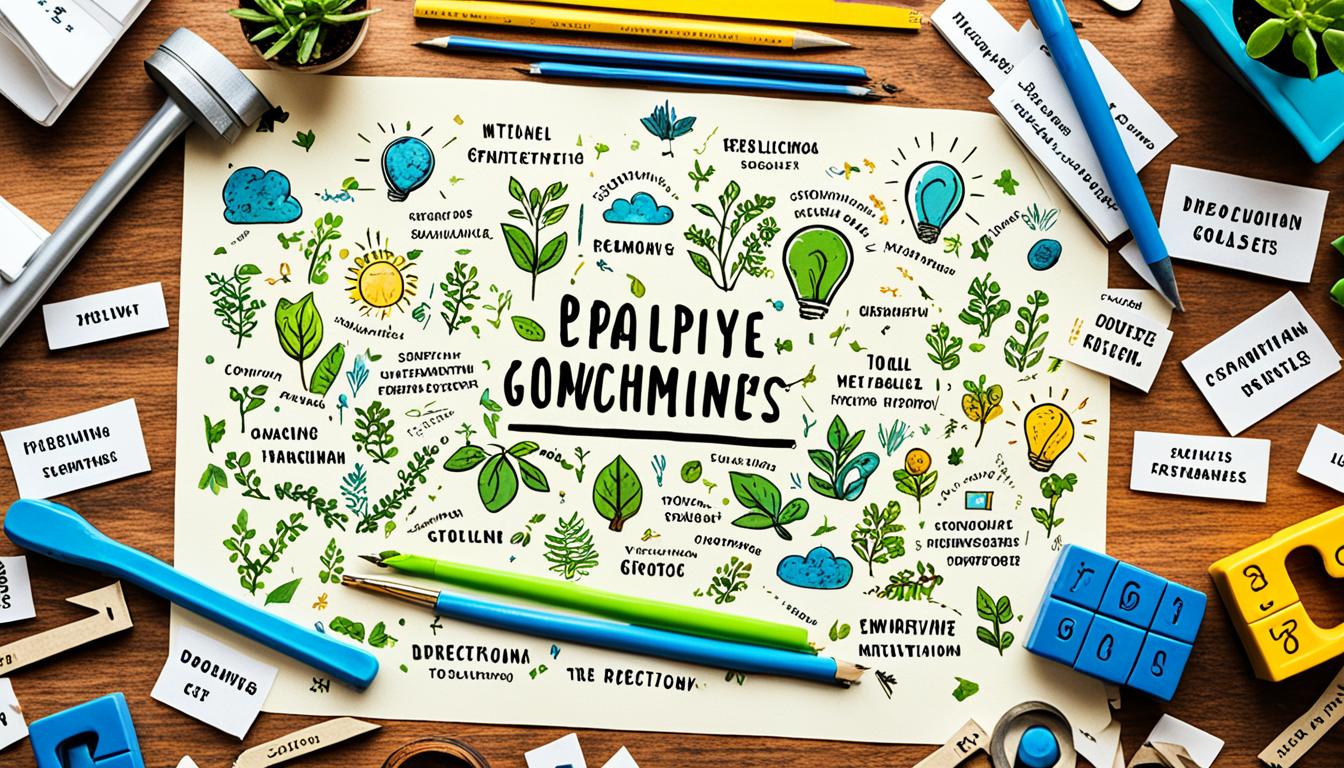Did you know that 90% of people who practice mindfulness report improved focus and reduced stress? Emotional well-being is not just a state of mind—it’s a skill you can develop. It’s the foundation of a balanced and fulfilling life. Whether you’re looking to manage stress, build resilience, or simply feel more connected, there are actionable steps you can take starting today1.
In this article, I’ll share nine proven strategies to help you strengthen your emotional health. From mindfulness and gratitude journaling to building meaningful social connections, these tools are backed by science and accessible to everyone. You’ll also find real-world examples from behavioral health experts to guide you2.
Ready to take the first step? Explore our free webinars and digital resources at digitals.anthonydoty.com. Your journey to a healthier, happier life starts now.
Key Takeaways
- Emotional well-being is a skill that can be developed with practice.
- Nine actionable strategies are covered, including mindfulness and gratitude journaling.
- Digital resources and free webinars are available for deeper learning.
- Building resilience and self-compassion are critical starting points.
- Emotional health is directly linked to life satisfaction and overall wellness.
Understanding Emotional Well-being and Its Impact
Building emotional well-being is a journey that impacts every aspect of your life. It’s not just about feeling good—it’s about thriving in all areas, from personal relationships to professional success. According to Kerry Welch from Mirmont Outpatient Center, emotional well-being involves managing feelings, adjusting to challenges, and finding purpose3.
What Is Emotional Well-being?
Emotional well-being is more than the absence of mental illness. It’s about cultivating positive states like life satisfaction, purpose, and resilience. The Introspection Counseling Center defines it as the ability to manage emotions, maintain healthy relationships, and find meaning in life4.
Research shows that emotional well-being has a multi-dimensional nature, including emotional, cognitive, and social aspects. This means it’s not just about how you feel but also how you think and connect with others5.
Why It Matters for Your Overall Health
Your emotional well-being directly affects your physical health. Studies reveal that stress and negative emotions can lead to issues like high blood pressure and a weakened immune system. On the flip side, positive emotions and coping mechanisms can improve both mental and physical health3.
Sleep quality, for example, plays a significant role in self-esteem and emotional resilience. A 2012 study found that better sleep leads to higher self-esteem, especially in adolescents3.
Building emotional resilience is a protective factor against long-term distress. It helps you process challenges and bounce back stronger. To learn more about this, explore our resource on emotional well-being.
The Power of Self-Compassion in Enhancing Emotional Health
Self-compassion isn’t just a buzzword—it’s a powerful tool for growth. It involves three key elements: self-kindness, common humanity, and mindfulness. These components work together to foster emotional well-being and resilience6.
Research shows that self-compassion leads to increased happiness, optimism, and connectedness while reducing anxiety and depression7. It’s about treating yourself with the same care you’d offer a friend, especially during tough times.
How to Practice Self-Kindness Daily
Start by acknowledging your feelings without judgment. Kerry Welch notes that we often treat others better than ourselves. To change this, try the “mental time out” technique. Pause, take deep breaths, and offer yourself support7.
Another effective practice is using affirmations. For example, replace “I’m not good enough” with “I’m doing my best, and that’s enough.” This shift in thoughts can create a more supportive inner dialogue6.
Breaking the Cycle of Negative Self-Talk
Negative self-talk can feel automatic, but it’s possible to interrupt it. The 5-second rule is a simple yet powerful way to stop criticism. Count backward from five and replace the thought with something kind7.
Angela Ficken, a Boston psychotherapist, suggests validating your emotions first. Say, “It’s okay to feel this way,” before reframing the thought. This approach fosters emotional well-being and builds resilience6.
For more strategies, explore our free self-compassion webinars and resources. Your journey to a kinder, more compassionate self starts today.
Building a Support System That Lifts You Up
A strong support system can transform how you navigate life’s challenges. Surrounding yourself with the right people fosters resilience and a sense of belonging. Whether it’s family, friends, or a broader community, these connections provide the foundation for growth and stability.
Choosing the Right Relationships
Not all relationships are created equal. Focus on quality over quantity. Emotional reciprocation, where both giving and receiving are balanced, is key to supportive connections8. Look for these signs in your relationships:
- Open communication: Honest and respectful dialogue is essential8.
- Active listening: Feeling heard and understood strengthens bonds8.
- Mutual respect: A foundation of trust and understanding.
If you’re unsure where to start, try a relationship audit. Map out your connections and evaluate their impact on your life.
The Role of Community in Emotional Resilience
Community involvement offers dual benefits—helping others while strengthening your own resilience. Volunteering, for example, fosters a sense of purpose and belonging9. It’s a powerful way to build connections and give back.
Online support groups and community centers also provide valuable spaces for connection. Platforms like Togetherall offer safe, anonymous spaces to share feelings and receive support10. Whether in-person or virtual, these communities can be lifelines during tough times.
For professional support, tools like Psychology Today’s therapist finder can help you connect with licensed experts tailored to your needs8. Remember, seeking help is a sign of strength, not weakness.
How Physical Health Fuels Emotional Well-being
Taking care of your body can have a profound impact on your mind. Physical health and emotional well-being are deeply connected. Small changes in your daily routine can lead to significant improvements in how you feel.

Exercise: A Natural Mood Booster
Exercise releases endorphins, the body’s natural mood boosters. This helps reduce stress, anxiety, and depression while improving self-concept and social behaviors11. Whether it’s a brisk walk, yoga, or gardening, physical activity can be tailored to your needs12.
Here are some adaptable options:
- HIIT: High-intensity workouts for quick results.
- Yoga: Gentle movements for relaxation and flexibility.
- Wheelchair-friendly exercises: Accessible routines for all abilities.
Even short bursts of activity, like “exercise snacking,” can make a difference. Try a 5-minute stretch or a quick walk to refresh your mind.
Sleep and Nutrition’s Hidden Effects
Sleep and nutrition play a crucial role in emotional stability. Poor sleep can lead to irritability and low resilience, while proper rest enhances optimism and focus11.
Follow this sleep hygiene checklist:
- Stick to a consistent bedtime.
- Avoid screens an hour before sleep.
- Create a calming bedtime routine.
Nutrition also matters. Magnesium-rich foods, like nuts and leafy greens, can reduce anxiety. Staying hydrated supports cognitive function and mood stability.
For more insights, explore the connection between physical health and mental.
Mindfulness and Meditation for Daily Calm
Mindfulness and meditation can transform your day, bringing calm and clarity. These practices help you stay present, manage stress, and process your thoughts and feelings with ease. Whether you’re new to meditation or looking to deepen your practice, there’s a method for everyone13.
One effective technique is the body scan. Focus on each part of your body, noticing sensations, tension, or relaxation. Combine this with deep breathing for enhanced calm13. Another simple method is the 4-7-8 breathing technique: inhale for 4 seconds, hold for 7, and exhale for 8. It’s a quick way to reset your mind14.
For those short on time, try mindful minutes. Accumulate small moments of mindfulness throughout your day. Focus on your breath, observe your surroundings, or practice sensory grounding. These brief pauses can make a big difference13.
Meditation isn’t just about sitting still. Explore walking meditation, where you focus on the movement of your legs and the environment around you. Or try a tea meditation, savoring each sip mindfully. These variations make meditation accessible and enjoyable13.
Research shows that meditation improves emotional regulation and reduces inflammation in the brain14. Whether you use apps or practice unplugged, the benefits are profound. Start small, stay consistent, and watch your daily calm grow.
Setting Goals That Nurture Your Growth
Setting clear goals can transform how you approach personal growth. Goals give you direction, purpose, and a sense of accomplishment. Whether you’re working on self-improvement or building resilience, the right objectives can make all the difference.
One proven method is the SMART framework. This approach ensures your goals are Specific, Measurable, Achievable, Relevant, and Time-bound. For example, instead of saying, “I want to feel better,” try, “I will practice gratitude journaling for 10 minutes every evening for the next month.” This clarity increases your chances of success15.
SMART Goals for Emotional Progress
Adapting the SMART framework to emotional objectives can help you track progress effectively. Research shows that writing down your goals and sharing progress with a friend significantly boosts achievement rates16. Start small, like setting a goal to meditate for 5 minutes daily. Over time, these small steps build momentum.
Another helpful technique is habit stacking. Pair a new habit with an existing one, like practicing deep breathing while brushing your teeth. This makes it easier to integrate positive changes into your routine16.
Celebrating Small Wins Along the Way
Celebrating small wins is crucial for maintaining motivation. Each milestone, no matter how minor, releases dopamine, a chemical that boosts happiness and confidence16. For example, reward yourself with a favorite activity after completing a week of journaling.
Tracking your progress is equally important. Use tools like apps or journals to reflect on your achievements. This not only keeps you motivated but also helps you measure your growth16.
Remember, perfection isn’t the goal. Adjust your objectives as needed and celebrate every step forward. Your journey to growth is unique, and every effort counts.
The Joy of Hobbies and Giving Back
Discovering hobbies and giving back can bring joy and purpose into your life. Engaging in activities you love not only boosts your mood but also helps you connect with others. Whether it’s crafting, gardening, or volunteering, these pursuits can make a meaningful impact17.
Finding Passion Projects That Inspire You
Exploring hobbies can lead to new skills and even inspire new careers. Creative activities like writing, painting, or gardening reduce stress and improve mental health17. Research shows that engaging in multiple enjoyable activities lowers blood pressure and cortisol levels, enhancing overall well-being18.
Here’s a simple way to discover your interests:
- Map your passions: Use an interest discovery questionnaire to identify what excites you.
- Try hobby rotation: Experiment with different activities to find what resonates.
- Join skill-sharing communities: Connect with others who share your interests.
Volunteering as a Path to Purpose
Volunteering is a powerful way to give back and feel part of something bigger. Acts of kindness, like helping at a local food bank or mentoring, foster social connections and enhance emotional well-being19. Studies show that altruism releases dopamine, boosting happiness and motivation17.
Here are some micro-volunteering opportunities to consider:
| Activity | Time Commitment | Impact |
|---|---|---|
| Writing letters to seniors | 30 minutes | Brightens someone’s day |
| Organizing a neighborhood clean-up | 1-2 hours | Improves community spaces |
| Sharing skills online | Flexible | Helps others learn |
Whether at home or in your community, giving back creates a ripple effect of kindness and connection. Start small, and watch how these activities enrich your life and the lives of others.
Conclusion: Your Journey to Emotional Wellness Starts Now
Your path to a balanced life begins with small, intentional steps. The nine strategies shared here—from mindfulness to building support systems—are your roadmap to emotional well-being. Remember, progress isn’t always linear. Setbacks are natural and can be valuable data points for growth20.
Take the 30-day challenge to integrate these practices into your routine. Start with gratitude journaling or a daily mindfulness session. Track your progress and celebrate every win, no matter how small20.
For deeper guidance, explore our free ebook on emotional first aid and join our upcoming live webinars. Visit digitals.anthonydoty.com for tools and expert support tailored to your needs.
Your journey is unique, and every step counts. Embrace the process, and remember: you’re not alone. Let’s build a stronger, more resilient you—starting today.
FAQ
What is emotional well-being?
Emotional well-being refers to how I manage my feelings, cope with challenges, and maintain a positive outlook on life. It’s about finding balance and resilience in my daily experiences.
Why does emotional well-being matter for my overall health?
It’s essential because it directly impacts my physical health, relationships, and ability to handle stress. When I feel good emotionally, I’m better equipped to thrive in all areas of life.
How can I practice self-kindness daily?
I start by treating myself with the same compassion I’d show a friend. Simple acts like positive affirmations, taking breaks, and acknowledging my efforts help me build a kinder relationship with myself.
How do I break the cycle of negative self-talk?
I focus on recognizing those thoughts and replacing them with positive, realistic ones. Journaling or mindfulness practices can also help me shift my mindset over time.
How do I choose the right relationships for my support system?
I look for people who uplift, listen, and encourage me. Healthy relationships are built on trust, respect, and mutual support, which help me feel valued and understood.
What role does community play in emotional resilience?
Being part of a community gives me a sense of belonging and connection. It provides a network of support, shared experiences, and opportunities to grow stronger together.
How does exercise boost my mood?
Physical activity releases endorphins, which naturally improve my mood and reduce stress. Even a short walk or yoga session can make a big difference in how I feel.
How do sleep and nutrition affect my emotional well-being?
Good sleep and balanced nutrition fuel my body and mind, helping me stay focused and emotionally stable. When I take care of these basics, I feel more energized and resilient.
What are SMART goals for emotional progress?
SMART goals are Specific, Measurable, Achievable, Relevant, and Time-bound. They help me create clear, actionable steps to improve my mental and emotional state.
Why is celebrating small wins important?
Acknowledging small achievements keeps me motivated and reminds me of my progress. It builds confidence and encourages me to keep moving forward.
How can hobbies improve my emotional well-being?
Hobbies give me a sense of joy and purpose. They allow me to express creativity, reduce stress, and take a break from daily pressures.
How does volunteering contribute to my sense of purpose?
Volunteering connects me with others and allows me to make a positive impact. It fosters gratitude, fulfillment, and a deeper connection to my community.







